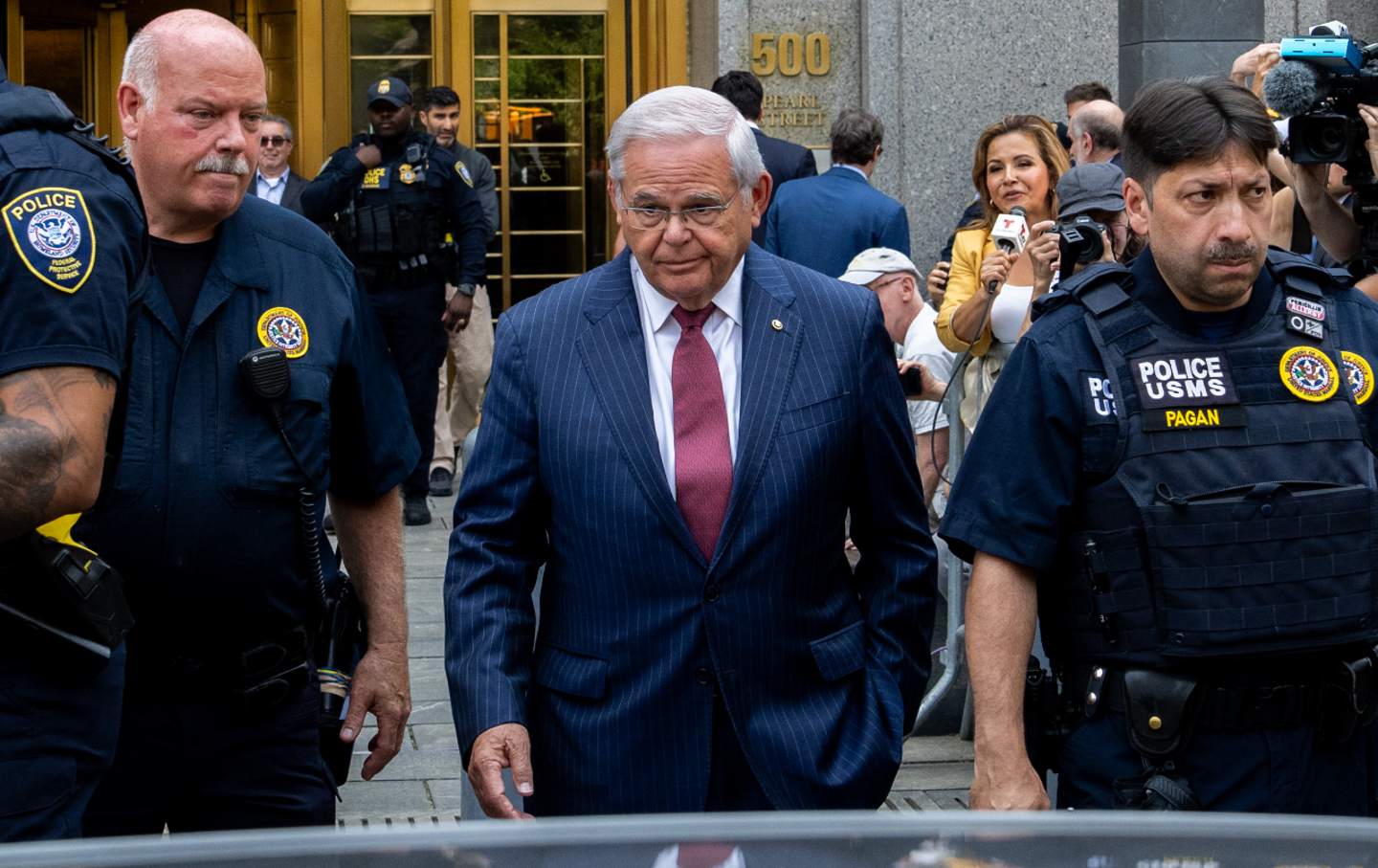Senator Robert Menendez and the Corruption of Cuba Policy
His retirement may bode well for US-Cuba relations—if Kamala Harris can retire Trump.

As Senator Robert Menendez cleans out his desk in the Hart Senate Office Building, he leaves Congress as one of the most corrupt US legislators in modern times. The senator’s July 16 conviction on 16 counts of bribery, extortion, and acting as an unregistered foreign agent has dramatically revealed how he abused his power and influence as chair of the Senate Foreign Relations Committee to line his pockets. Lost in the scandal of his flagrant corruption, however, is how Menendez used his political muscle for years to corrupt US policy toward Cuba.
Menendez rose to power in Union City, New Jersey, a mini-Miami on Hudson with the largest concentration of Cuban exiles outside Florida. He was the product of the state’s Democratic political machine and a reliably liberal vote on most issues during his six terms in the US House of Representatives and 18 years in the Senate—but not on Cuba.
On relations with Havana he was, as one longtime associate put it, “unmovable”—a position Menendez attributed to his family history in Cuba, even though he was born in the United States and his parents came as economic immigrants in the early 1950s, long before Fidel Castro’s revolution. During his corruption trial, the Senator reached for this legend when trying to explain the $635,000 in cash and gold bars the FBI found in his home in 2022, claiming that hoarding cash was a family tradition because his parents had faced “confiscation” in Cuba. The jury didn’t buy it.
Being tough on Cuba was a way for an aspiring politician to court Cuban exiles, not only in Union City, but in Miami as well, where Menendez made regular fundraising trips, starting when he was Union City’s mayor. Along with Robert Torricelli (another New Jersey Democrat driven from the Senate by a corruption scandal), Menendez was a favorite of the militant and the monied Cuban Americans in south Florida, who, from 1992 to 2006, contributed a million dollars to his campaign coffers to jump-start his political career in the House of Representatives.
To satisfy that constituency, Menendez became an implacable and pugnacious foe of even the smallest steps to relax tensions with Havana. In 1993, as a freshman House member, he introduced the “Free and Independent Cuba Assistance Act” prohibiting the president from lifting the embargo until Cuba became a democracy with a market economy. The bill didn’t pass, but it provided the blueprint for the Cuban Liberty and Democratic Solidarity Act of 1996 (aka Helms-Burton), on which Menendez was an original cosponsor. That law, more than any other, has hamstrung every president’s authority to engage with Cuba.
Menendez opposed President Ronald Reagan’s 1988 migration agreement with Cuba because it “gave up too much,” and he opposed the Clinton administration’s 1993 negotiations to repatriate migrants who committed crimes in the United States. During the 1994 rafters migration crisis, he joined Republicans demanding that President Clinton cut off all travel and remittance flows to Cuba and impose a military naval blockade to topple the regime. Clinton agreed to the financial sanctions, not the blockade. Menendez then opposed Clinton’s 1995 migration accord with Cuba regularizing safe and legal migration.
Menendez had an equally dim view of travel. He has opposed “people-to-people” educational travel ever since President Clinton first introduced it in 1999, calling it tourism in disguise and caustically accusing travelers of lying on the beach, smoking Cuban cigars, and sipping Cuba Libres.
Even measures benefiting Cuban American families were unacceptable. Menendez opposed easing US restrictions on remittances, arguing—falsely—that the regime was confiscating most of money. In May 2022, when President Biden eliminated Trump era limits on family remittances and authorized air links to cities besides Havana to facilitate family visits, Menendez complained that it sent “the wrong message” to the Cuban regime.
Clashing With Obama
Senator Menendez was a thorn in President Obama’s side from the moment he entered the White House. Obama had campaigned on the need for a new approach to Cuba, but Menendez was having none of it. Before the election, he warned Obama, “If you want my support, I don’t want you making any policy changes on Cuba without consulting me.”
Just weeks after the inauguration, Menendez showed that he meant business by blocking an Omnibus Appropriations bill needed to keep the government open, because the bill facilitated agricultural sales to Cuba and relaxed travel restrictions. He relented only when Obama’s treasury secretary pledged in writing to interpret the law narrowly and consult with the senator before changing Cuba policy.
When the Organization of American States convened in June 2009 to repeal the 1962 suspension of Cuba’s membership, Menendez, chair of the Senate subcommittee that approves foreign aid, threatened to cut off US funding—making up 60 percent of the OAS budget—if Cuba was readmitted. Under US pressure, the OAS reactivated Cuba’s membership provisionally, effective only if Cuba accepted the organization’s democratic principles. Cuba declined the invitation.
When USAID subcontractor Alan Gross was arrested in Cuba in December 2009, US officials hoped to win his release by downsizing the aggressive “democracy promotion” programs they inherited from George W. Bush. Cuban diplomats indicated that they were open to the idea, but Menendez got wind of the plan and called the White House demanding that it be abandoned. Rather than pick a fight with the senator, the administration capitulated.
Alan Gross sat in a Cuban jail for another four and a half years. Throughout, Menendez opposed any negotiations to win his freedom. When Gross finally came home on December 17, 2014, as part of Obama’s historic decision to normalize relations with Cuba, Menendez criticized the “swap of convicted spies for an innocent American” in a deal that “vindicated the brutal behavior of the Cuban government.”
After the early clashes with Menendez, the Obama White House asked the senator what steps to improve relations with Havana he could support. The answer came back: none. That rigidity proved to be Menendez’s undoing. Obama was committed to changing Cuba policy, and if Menendez was unwilling to consider even modest steps, consulting him was pointless. When Obama and Raúl Castro announced their agreement to normalize US-Cuban relations, a chagrined Menendez joined the chorus of Republicans denouncing the new policy as “a reward that a totalitarian regime does not deserve.”
Menendez then spent the next two years opposing every step toward normalization. He rebuked the president for taking Cuba off the State Department’s list of state sponsors of international terrorism, calling it a “reward…for decades of repression.” He criticized every regulatory change that made travel and commerce between Cuba and the United States easier. He joined with Marco Rubio (R-FL) to block Obama’s appointment of an ambassador to Havana and the appointments of other candidates he deemed soft on Cuba.
Of course, he bitterly criticized Obama for visiting Cuba in 2016, declaring, “It is totally unacceptable for the President of the United States to reward a dictatorial regime with an historic visit when human rights abuses endure and democracy continues to be shunned.”
When President Donald Trump abruptly reversed Obama’s normalization policy in 2017, tightening economic sanctions, Menendez applauded the move as “a step in the right direction,” lamenting only that it did not go far enough.
Menendez and Biden
The doors of the White House reopened for Menendez when Joe Biden became president. Biden relied on Cuban Americans to shape his Cuba policy, regularly inviting selected community leaders to the White House for consultations. Menendez blackballed anyone who advocated lifting the embargo, skewing the administration’s view of Cuban American opinion. Biden also spoke with Menendez regularly. Working the room after his 2023 State of the Union address, he was overheard telling Menendez, “Bob, I gotta talk to you about Cuba.” Meanwhile, senators and House members who supported Obama’s policy of engagement waited months for an audience with the president.
Menendez reached this pinnacle of influence over Cuba policy partly because of his personal relationship with the president, forged during their years together in the Senate. But his principal source of influence was his position as chair of the Senate Foreign Relations Committee, a perch from which he could either fast-track or block Biden’s foreign policy priorities and appointments. “He has used the chairmanship of that committee as a venue for intimidation and retribution, to raise the cost of doing anything he doesn’t like,” said Ben Rhodes, Obama’s deputy national security adviser. In a closely divided Senate, Biden needed every Democratic vote to advance his sweeping legislative agenda. The Biden White House decided early on that Cuba policy was just not important enough to antagonize Senator Menendez.
The result has been a policy much closer to Trump’s than to Obama’s—a continuation of punishing economic sanctions that have contributed to the largest migration crisis in Cuban history.
Popular
“swipe left below to view more authors”Swipe →A Brighter Future for Cuba Policy?
The impending retirements of Biden and Menendez, one with dignity, one in disgrace, may bode well for relations with Cuba—if Vice President Kamala Harris can finally retire Donald Trump. Harris’s record on Cuba is sparse but progressive. In 2017 and 2019, she cosponsored Senate bills to end restrictions on travel, and during her 2020 run for the presidency, she called for lifting the embargo. A generation younger than Biden, she is less shackled by the Cold War mindset that framed his Cuba policy.
As vice president, Harris has said little about Cuba, but her work to reduce the root causes of migration by boosting Central American economies has no doubt given her an appreciation of how economic sanctions against Cuba are spurring more and more people to flee their homeland.
“Most people don’t want to leave home,” she said, describing the core assumption of her approach to migration. “When they do, it is usually for one of two reasons: Either they are fleeing harm or to stay home means they cannot satisfy the basic needs of their families.” The solution, she explained, is “to help people find hope at home.” The way the United States can help Cubans find hope at home is to return to a policy of engagement that alleviates the acute humanitarian crisis on the island and offers Cubans the prospect of a brighter future.
More from The Nation

This Is Not Solidarity. It Is Predation. This Is Not Solidarity. It Is Predation.
The Iranian people are caught between severe domestic repression and external powers that exploit their suffering.

How a French City Kept Its Soccer Team Working Class How a French City Kept Its Soccer Team Working Class
Olympique de Marseille shows that if fans organize, a team can fight racism, keep its matches affordable, and maintain a deep connection to the city.

Donald Trump’s Nuclear Delusions Donald Trump’s Nuclear Delusions
The president wants to resume nuclear testing. Senator Edward Markey asks, “Is he a warmonger or just an idiot?’

The Colonial Takeover of Venezuela Begins with Corporate Investment The Colonial Takeover of Venezuela Begins with Corporate Investment
The spectacle of Nicolás Maduro’s capture has drawn attention away from the quieter imposition of systems and power networks that constitute colonial rule.

The US’s Nuclear Arms Treaty With Russia Is About to Lapse. What Happens Next? The US’s Nuclear Arms Treaty With Russia Is About to Lapse. What Happens Next?
If the US abandons New START, say goodbye to that comfortable feeling we once enjoyed of relative freedom from an imminent nuclear holocaust.

Trump’s Predatory Danger to Latin America Trump’s Predatory Danger to Latin America
The United States is now a superpower predator on the prowl in its “backyard.”


